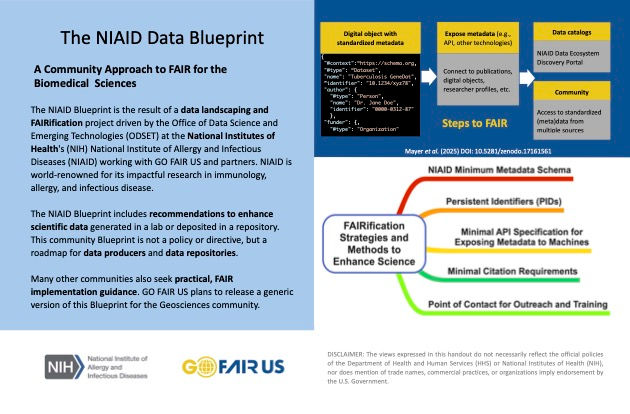GO FAIR US Launches a Biomedical Workshop Series on Semantic Resource Management
- Lynne Schreiber and Julie Christopher
- Jun 30, 2025
- 2 min read
Updated: Aug 25, 2025
To support NIH stakeholders in accessing cutting-edge methods and community-driven knowledge, the GO FAIR US program at the University of California San Diego hosted a four-part virtual workshop series titled Managing Semantic Resources: Stakeholder-led Coordination on June 2, 4, 9, and 11, 2025.
The series brought together 45 participants from academia, government, nonprofits, and industry, all focused on advancing data reuse, reproducibility, and robust semantic practices in biomedical research.
Throughout the sessions, experts presented a range of shared semantic resources and discussed the sociotechnical challenges of managing and coordinating them. Featured case studies included the Protein Data Bank, the Biomarkers Consortium, and the Common Fund Data Ecosystem’s Crosscut Metadata Model (C2M2). A hands-on activity challenged participants to upgrade an existing vocabulary, encouraging active learning and practical application.
Participants also examined real-world lessons from semantic resource development, with a strong emphasis on community-building strategies. In the final session, in-depth discussions addressed key questions such as:
How do ontologies define and maintain curation quality?
How can redundancy across domain-specific ontologies be minimized?
What are effective strategies for merging ontologies into a unified vocabulary?
How should teams select semantic resources based on data types or specific use cases?
What governance models and inclusive practices best support sustainable, community-led development?
To help participants translate insights into action, the workshop concluded with a templated action plan. Additionally, the GO FAIR US team scheduled a two-week follow-up and plans a 3–6 month check-in to understand how participants are applying what they learned in their own contexts.
The workshop series was made possible through the leadership of Christine Kirkpatrick and the expertise of a dedicated team of instructors and support staff. Representing GO FAIR US, co-instructors Nancy Hoebelheinrich and John Graybeal brought deep knowledge and technical applications in semantic resource management. They were joined by Waymark Analytics co-instructors Joel Cutcher-Gershenfeld, Barbara Mittleman, and Pat Canavan, who contributed valuable insights into community-led coordination, change management and stakeholder alignment.
Behind the scenes, the event was expertly supported by our project managers and informatics specialists—Lynne Schreiber, Julie Christopher, Chris Erdmann, and Michael Haberman—whose coordination and technical expertise ensured a smooth and impactful experience for all participants.
This workshop series underscores the importance of coordinated, community-driven efforts to strengthen the semantic infrastructure supporting biomedical research.
Presentation Slides: https://doi.org/10.6075/J06Q1XNM
Session 1: Knowledge Organization Systems
Session 2: Sociotechnical Change Management
Session 3: Semantic Resource Development
Session 4: Putting it all together
This work was supported by the National Institutes of Health (NIH) through a contract with the MITRE Corporation (Task Order 1170591). The content is solely the responsibility of the authors and does not necessarily represent the official views of the NIH or the MITRE Corporation.



Comments